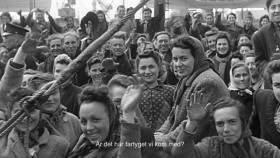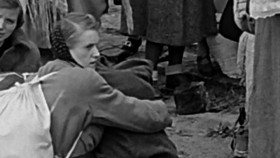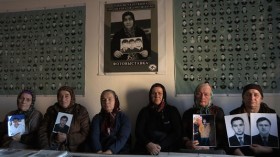Den 28. april 1945 kom 1948 flygtninge med skib til Malmö, jeg ser det i en smuk newsreel beregnet til biograferne næste dag. Eller rettere, jeg ser det i en hensynsfuldt og dygtigt bearbejdet version af optagelserne fra den dag. En fortællerstemme af den slags, jeg altid bliver tryg ved, tager over, tager ved hånden, fortæller roligt, hvad det er, jeg ser. Det er befriede fanger fra de efterhånden erobrede tyske koncentrationslejre, mange af dem jøder i sidste øjeblik reddet fra udryddelsen, polske unge, nogle mødre med børn, franske modstandsfolk og britiske efterretningsfolk og også dem, som var forfærdende uheldige på et bestemt sted et bestemt tidspunkt. Roligt vises deres ansigter, mange er nu glade og smilende, andre forholder sig afventende, vil jeg tro, i en smertende ro. Alt i denne film er ro, bliver jeg lovet, fra begyndelsen til slutningen. Det giver mig tid til at tænke mig om, til at huske selv, til at associere. Til at udvide filmen i en egentlig tilegnelse.
Ja, udvide. For der egentlig ikke så meget. De filmiske elementer er få, men de er bragt i anvendelse aldeles overbevisende. Der er altså en 35 mm arkivfilm, men klippet med en ny opmærksomhed og behandlet i overførslen, så nye detaljer må være kommet til syne. Desuden er optagelserne varsomt og varieret (tror jeg) tempoændret, så jeg sættes i en opmærksomt drømmende tilstand, hvor reportageoptagelserne får alvor og tyngde og overraskende skønhed, de viser ikke længere alene hen til fortidens hændelser, de er nuværende begivenheder. Og der er en forbilledlig og lykkelig research, som først og fremmest har fundet et stort antal vidner frem blandt flygtningene, og heraf medvirker en markant række i filmen, og mens de ser optagelserne på skærmen, formår de hver og en på meget forskellig måde, men alle tøvende og prøvende, at tale om disse optagelser sådan, at de derved statuerer optagelsernes poesi ved billedernes iboende kraft mere end ved deres historiske og biografiske meddelelser. Det er disse ansigters navne, det handler om, men selvfølgelig på alle glemte navnes vegne. Her er den smukke titels meningsfuldhed, her er filmens kerne, værkets essay, dets overvejelse af humanitetens evige genetablering.
Det første vidne foran computerskærmen med den gamle reportage hedder Fredzia Marmur. Hun var fra Lodz i Polen, bor nu i Toronto, Canada, Hvor Gertten besøger hende med sin computer og sin fotograf. Hun gennemspiller hele den vanskelige genkendelse over de mange år, over de fortrængte følelser, bliver usikker på sig selv, men opdager lidt efter lidt med filmens publikum, at hun husker alt, genkender meget. Ansigt efter ansigt får navn. Elsie Ragusin er amerikaner. Med sin far var hun i 1939 på familiebesøg i Italien. Ved krigens udbrud blev de tilbageholdt og endte i Auschwitz. Hun overlevede og genkender tøvende sig selv på billederne fra havnen i Malmö. Nordmanden Svenn Martinsen er også med skibet, 23 år dengang med huen kækt på sned. Nu sidder han på sengekanten og snakker med sig selv, fortæller han. Han fortæller om en mislykket aktion, han var med i dengang, en norsk gruppe ville for svensk Røde Kors redde jødiske børn fra medicinske forsøg i en lejr nær Hamburg. De nåede ikke frem i tide, børnene var dræbt, da de fandt dem. To flygtninge, spædbørn dengang, Ryszard Glozacha, som nu bor i Oxelösund, Sverige og Piotr Górska, som nu bor i Drezdenko, Polen og deres mødre, Sabina Glozacha er ansigter i havnescenen, som nu får navne, jeg ved at de levende bylter i kvindernes arme er de to små drenge. En tredje kvinde med et spædbarn, Alicja Lutostanska får sit navn forbundet med scenen og med de to andre kvinder. De var alle tre, gravide forstår jeg, blevet fanget af tyske tropper under Warszawa opstanden 1944. Alicja Lutostanskas lille datter Bozna døde kort efter i Malmö. Dette kunne fortsætte, alle ansigter har et navn.
Filmens højdepunkt er en lang smukt, smukt klippet sekvens om lykken ved at komme i brusebad. Efter lægeundersøgelse og desinficering kommer alle flygtningene i bad, det første i årevis. Klipperen Jesper Osmund fortæller også denne mærkelige hændelse, denne som et crescendo af lykkefølelse, disse forpinte, nøgne kroppe i masser af styrtende vand. Rensende og livgivende.
Et sidste element er optagelser fra 1. juli 2014 af 596 flygtninge til havnebyen Pozzallo, Sicilien. 45 af den bringes op fra fiskerbådens lastrum, døde. Disse optagelser dæmpet til langsomme filmscener som arkivoptagelserne fra 1945 har Jesper Osmund sat ind i filmens forløb som vignetter til min eftertanke. Ja, netop. De udvider provokerende min forståelse, at denne genetablering er en evig gentagelse.
Sverige 2015, 73 min.

SYNOPSIS
”In the fascinating Swedish documentary “Every Face Has a Name,” helmer Magnus Gertten tracks down and interviews survivors from German concentration camps seen in a 35mm archival film reel showing their arrival at the harbor of Malmo, Sweden, on April 28, 1945. The group includes Jews from all over Europe, Norwegian prisoners of war, Polish mothers and children, members of the French resistance and British spies — and perhaps unique among them, a young Italian-American who was accused of being a spy while visiting her grandparents and deported to Auschwitz…”
”Figuring prominently here is the shocking story of Elsie Ragusin, a now-93-year-old Roman Catholic who lives in Orlando, Fla. The only Italian-American to survive Auschwitz, she went with her father to visit relatives in their home country in 1939; the pair found themselves stuck there when Italy entered the war in 1941 and were soon arrested by Germans who accused them of espionage.”
”New York-based brother-sister duo Bernhard Kempler and Anita Lobel relate their remarkable survival tale with a surprising lack of sentiment. Bernhard was 9 years old when he came to Malmo, having remained alive during the war by dressing as a girl. He and older sister Anita were sent away from Krakow by their parents and spent the war years together, under false identities, constantly escaping and hiding. When they were finally reunited with their parents in Sweden in 1947, he recalls that he felt no emotion, only the feeling they he didn’t want to be looked at.”

”In contrast, former Norwegian POW Svenn Martinsen is obviously moved by the images of his 23-year-old self disembarking in Malmo after two-and-a-half years in captivity. He recalls the sense of cognitive dissonance he felt, not able to believe that this was freedom at last. More disturbingly, he recounts being at a camp outside Hamburg where the SS were performing experiments on Jewish children. The Norwegians hatched a plan with the Swedish Red Cross to rescue the kids, but before it could be carried out, the youngsters were murdered…”
”Throughout the film, editor Jesper Osmund cuts to a small harbor in Sicily where Gertten and his team filmed as nearly 600 refugees arrived after a dramatic journey over the Mediterranean Sea…”
PRODUCTION
”Tech package looks fine, with a new 4k scan of the archival footage revealing novel details.
Reviewed at Gothenburg Film Festival (competing), Feb. 1, 2015. Running time: 76 MIN.
An Auto Images production in co-production with SVT, Film i Skane, DHF, Ikon, Nord Vision, with the support of the SFI, Nordisk Film & TV Fond, Midt Norsk Filmsenter, Konstnarsnamnden, Malmo Stadt, Malmo Forkskonings, Media, in cooperation with Nordvision. (International sales: Rise and Shine World Sales, Berlin.) Produced by Leonard Strom, Magnus Gertten, Dag Hoel.”
CREW
”Directed by Magnus Gertten. Written by Gertten, Jesper Osmund. Camera (color/B&W, HD), Gustaf Boge Claredio, Adam Makarenko, Caroline Troedsson, Arne D.S. Haldorsen, Sven Lindahl, Tony Miller, Mattias Olsson, Magnus Rutberg, Jacek Szymanski, Ita Zbroniec-Zagr; editor, Jesper Osmund; music, Hans Appelqvist; sound, Audun Rostad, Jorgen Meyer; visual effects supervisor, Rune Felix Holm; research, Sebastian Claesson, Gertten.”
WITH
”Piotr Gorski, Phillip Jackson, Bernhard Kempler, Ryszard Lagemo, Anita Lobel, Fredzia Marmur, Svenn Martinsen, Judith Popinski, Elsie Ragusin, Nurit Stern.” (From a review by Alissa Simon in variety.com Read the review here: variety.com)
And the trailer here:
https://vimeo.com/118833404?from=facebook
Magnus Gertten har over samme begivenhed og materiale tidligere, i 2012, lavet ”Harbour of Hope”.





